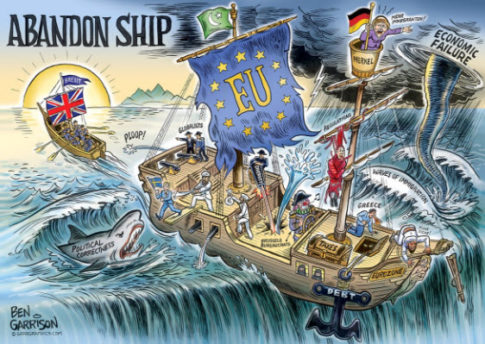I’ve made a short film with my friend Roger Bowles about why I’ll be voting Leave on 23 June and why I think you should, too. We’ve focused exclusively on the sovereignty argument, which we think is the most persuasive one. If you’re on the same side as us, please share this with as many people as possible.
We’ve called it ‘Brexit: Facts Not Fear’ because we think it’s important that people should be acquainted with as many facts as possible when they cast their vote. Below is a transcript of the film, with links corroborating the facts referred to.
Hi. I’m Toby Young, I’m an associate editor of the Spectator. The British public have been crying out for facts in the Brexit debate so they can make an informed choice about whether to leave or remain in the European Union. So I want to give you some facts about what’s happened to British sovereignty since we joined what was then called the European Economic Community in 1973.
This room is where we keep the Spectator’s archives dating back to 1828 and I recently helped put together an anthology of material than appeared in the magazine in the run up to the first European referendum in 1975. The Spectator was one of only two publications to campaign for a Leave vote at the time, the other being the Morning Star.
In the official government pamphlet urging us to vote ‘Yes’ in 1975, the British people were given a guarantee that no law could be imposed on them without the consent of their elected representatives. ‘No important new policy can be decided in Brussels or anywhere else without the consent of a British Minister answerable to a British Government and British Parliament… The Minister representing Britain can veto any proposal for a new law or new tax if he considers it to be against British interests.’ That ‘veto’ turned out to be a figment of the government’s imagination.
Even back in 1973 when we first joined the EEC we didn’t have a veto over every new law proposed in Brussels. Some laws required a unanimous vote of the Council of the European Union, meaning any member state could veto them. Others could be passed by a majority vote. The 1975 government pamphlet urging us to vote ‘Yes’ tried to gloss over this inconvenient fact by using the weasel word ‘important’ – ‘No important new policy can be decided in Brussels’. But each time more countries join the European Union and another treaty is passed – each one bringing us closer to a United States of Europe – the number of laws deemed ‘important’ enough to require a unanimous vote gets smaller and smaller.
For instance, before the Treaty of Lisbon was passed in 2007, each member state had a veto over the EU’s common defence policy. Today, that can be decided by a majority vote. As a result of the Treaty of Lisbon, Britain lost its veto in over 40 policy areas. Defenders of the EU will tell you that Britain can still block EU laws, even if we can no longer veto them. Surely, if we oppose a particular measure, we can assemble a coalition of like-minded countries to join with us to defeat it?
In fact, finding other European countries willing to ally themselves with Britain has proved difficult. In the past 20 years, there have been 72 occasions when Britain has opposed a particular measure on the Council of the European Union. On all 72 occasions, we have been outvoted by the other member states. When it comes to the sovereignty of the British Parliament, the 1975 government pamphlet got it back to front.
While Britain can’t veto all new laws or new taxes made by the European Union, the European Union can veto laws and taxes made in Britain. For instance, in 1983 the European Court of Justice in Luxembourg ruled that the UK’s low duty on beer, as proposed by Nigel Lawson in his 1981 budget, was contrary to Article 95, paragraph two, of the Treaty of Rome. The British government had no choice but to put up the price of beer. No wonder the former Conservative Chancellor now believes Britain would be better off outside the EU.
* * *
PayPal: Donate in USD
PayPal: Donate in EUR
PayPal: Donate in GBP
* * *

